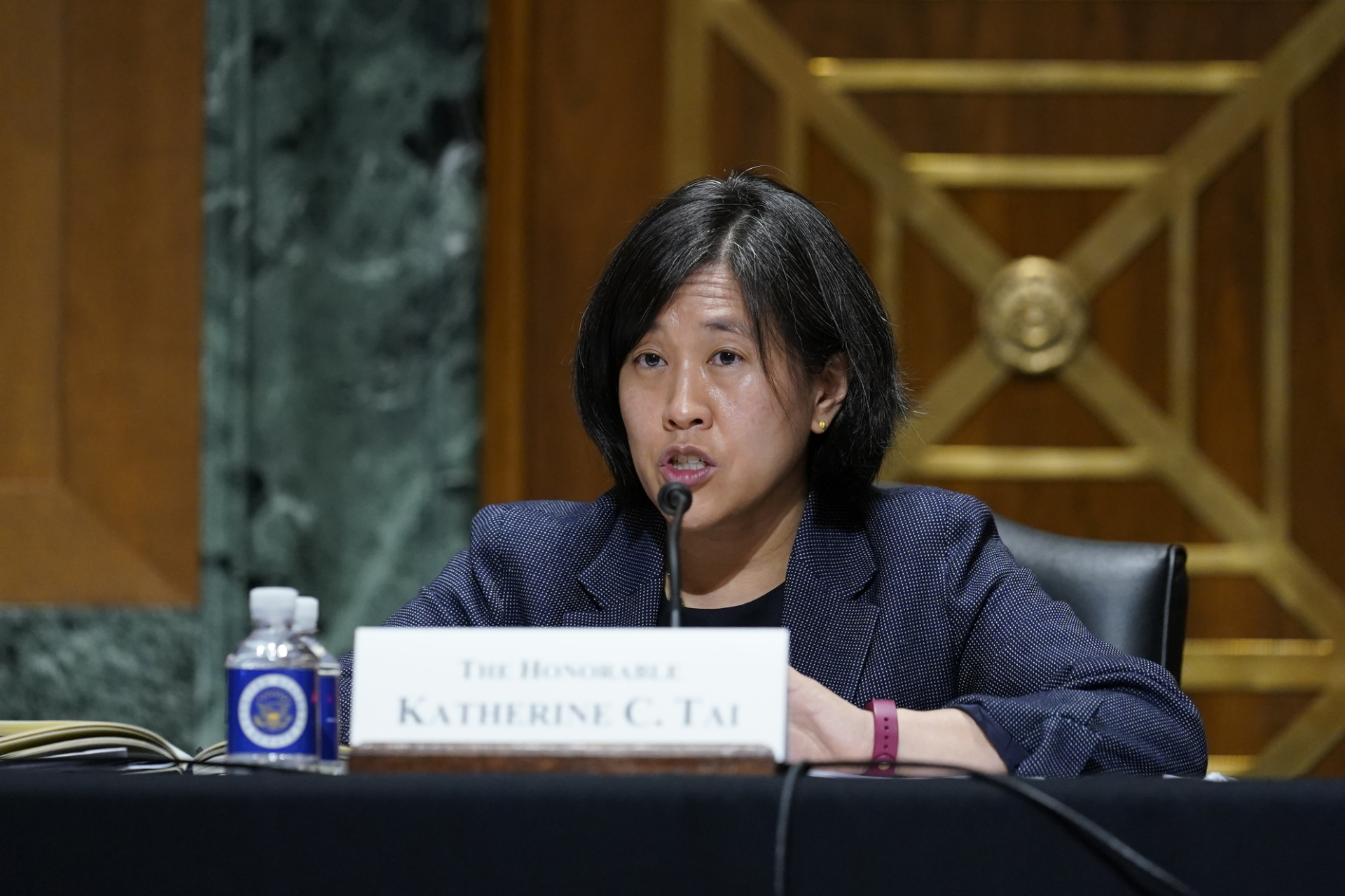Biden’s trade chief presses China to fulfill Trump agreement pledges, signals little change in tariffs
Does the Biden administration have its own China trade strategy, or is it just “Trump with allies”? U.S. trade representative Katherine Tai gave a speech on China that recalled Trump’s tactics: castigating “state-centered” economics while demanding that Beijing direct more purchases of American goods, and offering both fig leaves and threats on tariffs.

The U.S.-China trade war, which started in mid-2018 with the first of many volleys of tariffs by the Trump administration, never really ended — and remains in a stalemate today.
- After a year and a half of tit-for-tat measures that left U.S. tariffs on Chinese imports more than six times higher than before, Trump’s January 2020 “phase one” agreement stopped the tariff escalation.
- However, the core of that agreement focused on encouraging Beijing to make state-directed purchases — exactly the sort of thing that previous American administrations had balked at — without resolving any of the most important economic disputes between the two countries, or even lifting that many tariffs.
- Joe Biden, then a leading contender to run against President Trump, called Trump’s deal “vague, weak.”
Today, the Biden administration laid out some of its views on trade with China, via a speech by United States trade representative Katherine Tai at the Center for Strategic and International Studies (CSIS), a Washington think tank (remarks as prepared; CSIS transcript including Q&A).
- Tai’s core message contained the same contradiction from the Trump administration: She at once castigated China for its “state-centered and nonmarket trade practices,” and also demanded that it live up to its commitments from the “phase one” trade deal, including what are essentially minimum export quotas.
- When asked about her view on “managed trade,” or the tactic favored by the Trump administration to demand purchase commitments from China, rather than stick by free trade principles, she said: “I’m a tremendously practical person. There are commitments that have been made…the question that I bring to this issue that you’ve presented is not ideologically how do I feel about it, but what is actually going to present results and what is actually going to be effective.”
- “China missed the goal for goods purchases by nearly 40% in 2020, according to calculations from Chad Bown, a senior fellow at the Peterson Institute for International Economics,” the Wall Street Journal noted. “As of data for the first 8 months of the year, China is on pace to be 30% short of its goal in 2021.”
More takeaways from Tai’s remarks:
- Some tariffs will be trimmed: Tai said that USTR “will start a targeted tariff exclusion process,” and “will keep open the potential for additional exclusion processes, as warranted.”
- But other tariffs may be coming: Tai did not deny reports that USTR was considering launching an investigation into Chinese industrial subsidies under “Section 301,” the same process that marked the start of the trade war in the first place.
- Market access, with an asterisk: Tai indicated that rather than push for more or less American presence in the Chinese market as a rule, she would seek to strengthen the U.S. position in supply chains, so that exchange with China is a “trade…as opposed to a dependency.”
- Probably no “phase two”: Tai said that she will have “frank conversations with my counterpart in China” and build on the existing trade agreement, but indicated that a push for a new bilateral agreement was not in the cards.
The bottom line: Not much is different between the Biden administration’s trade policy regarding China and the old Trump administration policy, at least according to Katherine Tai’s comments, which are the most detailed so far. The main point of difference is that Biden is far more willing to work with allies to pressure China.
- But is working with allies all talk, no deal? One obvious way to make allied pressure on China concrete would be to promote the CPTPP, the anti-China trade deal that China is now applying to join.
- However: “Few experts expect Biden to join CPTPP because of the political backlash it would spark ahead of the 2022 midterm elections,” the Financial Times reports. “Asked whether the U.S. was warming to the idea of the trade deal, or considering trying to block China from joining, Tai suggested that Washington was not interested in joining the trade pact.”






